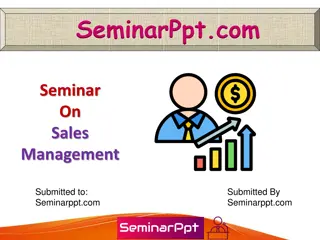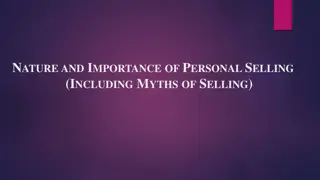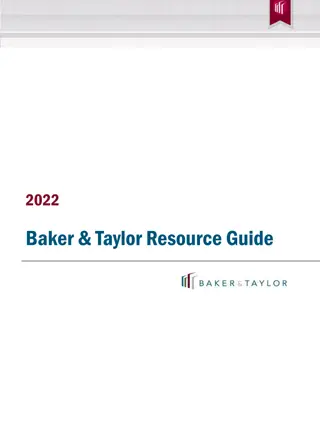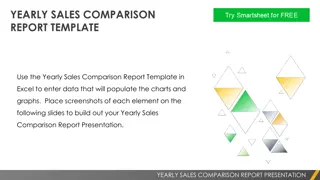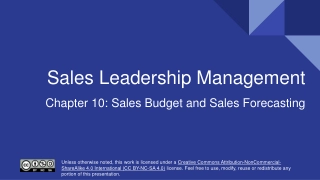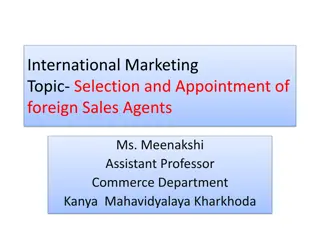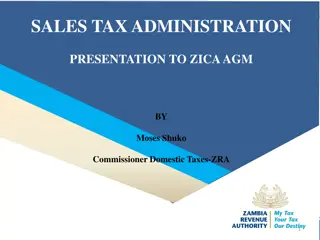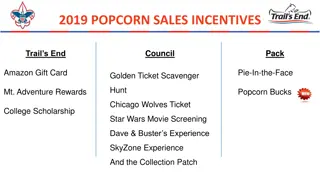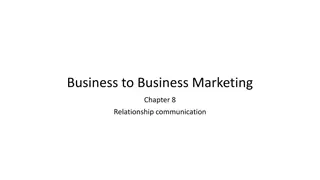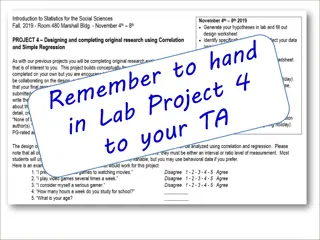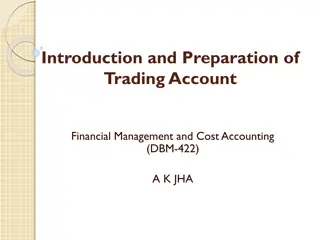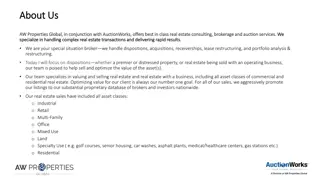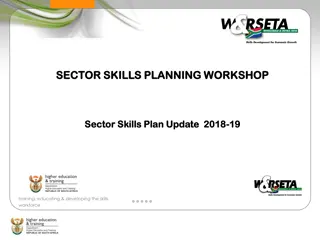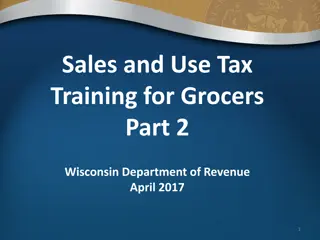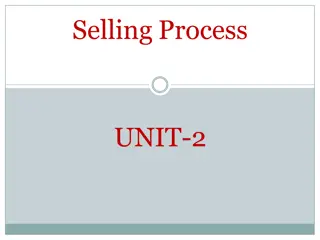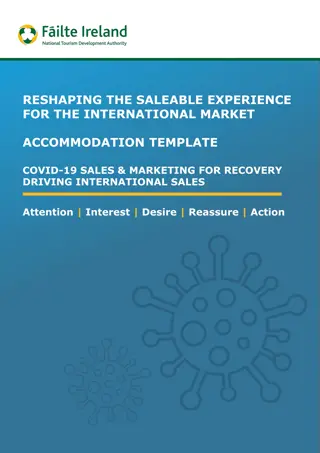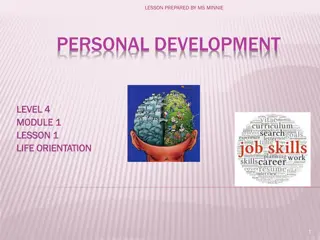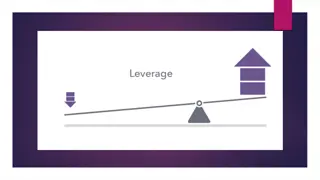Understanding Personal Selling in Sales Management
Personal selling is a crucial aspect of the marketing mix, involving oral and physical presentations by salespeople to identify and solve buyer problems. This module explores the nature, importance, role, and traits of successful salespeople, along with job analysis and specifications. Salespeople play a significant role in providing feedback to marketing management, contributing to organizational profitability and future sustainability. Key traits of successful salespeople include creativity, self-motivation, persuasiveness, self-confidence, empathy, and adaptability.
Download Presentation

Please find below an Image/Link to download the presentation.
The content on the website is provided AS IS for your information and personal use only. It may not be sold, licensed, or shared on other websites without obtaining consent from the author. Download presentation by click this link. If you encounter any issues during the download, it is possible that the publisher has removed the file from their server.
E N D
Presentation Transcript
Module 1 Nature and extent of personal selling PERSONAL SALES AND THE MARKETING MIX Personal selling is the oral and physical offering of a product by a salesperson, to one or more prospective buyers with the purpose of identifying a problem or problems. The marketing mix consists of the so-called four Ps: Product, Price, Place, Promotion. www.futuremanagers.com
Module 1 Nature and extent of personal selling (continued) THE IMPORTANCE OF PERSONAL SELLING IN MARKETING Salespeople are becoming more and more involved in the determination of marketing needs and problems. Owing to this, it is that the salesperson provides feedback to marketing management as part of his primary task, by liaising with prospects and clients and by consulting with them about the organisation s marketing functions. www.futuremanagers.com
Module 1 Nature and extent of personal selling (continued) THE ROLE, TASK AND FUNCTION OF PERSONAL SELLING The modern professional salesperson: Provides an extremely important and indispensable service to the community; Ensures that the economy is kept healthy and balanced; and Makes a positive contribution to the profitability and future existence of his organisation. www.futuremanagers.com
Module 1 Nature and extent of personal selling (continued) JOB ANALYSIS, JOB DESCRIPTION, JOB SPECIFICATION Job analysis is done to enable management to answer questions about a specific position or job. A job description is compiled from the information gained. A job specification is an explanation of the minimum personal characteristics, such as skills, knowledge, experience, qualifications and abilities, required by the incumbent to be able to fill the position successfully. www.futuremanagers.com
Module 1 Nature and extent of personal selling (continued) PERSONALITY TRAITS OF A SUCCESSFUL SALESPERSON The majority of successful salespeople all share traits including: Creativity, resourcefulness and imaginativeness; Self-motivation to attainment of goal; Persuasive and mentally sharp; Self-confidence and self-assuredness; Social, person- and service-orientated with empathy; and Observant; studios, adaptable and reliable. www.futuremanagers.com
Module 1 Nature and extent of personal selling (continued) PHYSICAL IMAGE OF THE SALESPERSON The following aspects of a person s physical image are important when dealing with customers: Personal neatness and attire; Appearance; Good health; Manners and habits; and Good use of voice. www.futuremanagers.com
Module 2 Essential knowledge needed for successful selling THE IMPORTANCE OF KNOWLEDGE Knowledge enables the salesperson to answer questions and to provide information, approach his presentation professionally and with confidence, overcome objections and achieve success in selling. The most important is product knowledge. www.futuremanagers.com
Module 2 Essential knowledge needed for successful selling (continued) TYPES OF KNOWLEDGE NEEDED Knowledge of the business. Knowledge of the industry. Knowledge of the competitors. www.futuremanagers.com
Module 2 Essential knowledge needed for successful selling (continued) PRODUCT KNOWLEDGE Product knowledge is of utmost importance to the salesperson, because if he cannot answer a prospect s questions about the product or prove that the use of his product will enable the prospect to satisfy his needs, solve his problem or fulfil his desires, the salesperson cannot expect to achieve any success in selling. www.futuremanagers.com
Module 2 Essential knowledge needed for successful selling (continued) SOURCES OF INFORMATION Experience gained in practice; Sales meetings; Training programmes; Educational institutions; Internet; Customers themselves; Mentor; Trade shows and exhibitions; Local chamber of commerce; Other salespeople; and Sales manuals, portfolios and The library. brochures; www.futuremanagers.com
Module 3 Sales forecasting THE IMPORTANCE OF FORECASTING A sales forecast is an estimate of sales at some point in the future. The most important function of forecasting is that it provides a basis for organisational planning and budgeting and forms part of the strategic planning process of a business. Managers can determine how many units to produce and distribute. www.futuremanagers.com
Module 3 Sales forecasting (continued) DEMAND ESTIMATION AND POTENTIAL Market potential refers to the total expected sales for a given product or service for the entire industry, in a specific market over a specific period of time. Sales potential, also known as market share, refers to the share of the market potential that an individual business can reasonably expect to achieve. www.futuremanagers.com
Module 3 Sales forecasting (continued) FACTORS INFLUENCING PROBABLE SALES VOLUME Any changes in a business's marketing policy/4 Ps. Any external or internal conditions in the market. Competitors entering the market. Political, economic and regulations in a country. www.futuremanagers.com
Module 3 Sales forecasting (continued) THE SALES FORECAST AND THE MARKETING PLAN The sales forecast typically is less than the sales potential for several reasons: Production facilities may be too limited to allow the business to reach its full sales potential. Current distribution systems may not reach all of its potential market. Financial resources/capital may be inadequate. www.futuremanagers.com
Module 3 Sales forecasting (continued) METHODS OF SALES FORECASTING Forecasts help determine the following: The number of salespeople to employ. The amount that can be spend on samples, travel and entertainment. www.futuremanagers.com
Module 3 Sales forecasting (continued) FACTORS INFLUENCING THE SELECTION OF FORECASTING METHODS Time available; Availability of data; Personnel/staff; Accuracy; and Product or service. www.futuremanagers.com
Module 4 Sales territories BENEFITS DERIVED FROM ESTABLISHING SPECIFIC TERRITORIES Some of the benefits obtained by establishing sales territories include: Ensure proper market coverage; Workload equalisation; Increases salespeople s morale; Better evaluation and control over sales force; Better analysis and planning of sales activities; and Sales are improved. www.futuremanagers.com
Module 4 Sales territories (continued) THE DESIGN/SETTING UP OF SALES TERRITORIES The most important consideration in territorial design is to have all territories equal in both sales potential and the salesperson s workload. The general steps applies: Select a geographical control unit. Determine the basic territories. Analyse salespeople s workload. Assign salespeople to territories. Determine sales potentials in each control unit. www.futuremanagers.com
Module 4 Sales territories (continued) FACTORS INFLUENCING SALES TERRITORY DESIGN (THE NUMBER AND SIZE OF THE TERRITORIES) Nature of the sales job; Nature of the product; Stage of market development; Intensity of market coverage; and Intensity of competition. www.futuremanagers.com
Module 5 Quotas/targets INTRODUCTION Quotas/targets are quantitative objectives assigned to sales organisational units, for example individual sales personnel. Sales management usually sets quotas for individual sales territories and sales personnel. www.futuremanagers.com
Module 5 Quotas/targets (continued) OBJECTIVES IN USING QUOTAS The general objective of quotas is to control the sales effort. Sales control is facilitated through setting quotas to use in appraising performances of sales territories and individual salespeople. Sales management uses quotas to motivate personnel to achieve desired performance levels. www.futuremanagers.com
Module 5 Quotas/targets (continued) TYPES OF QUOTAS AND QUOTA-SETTING PROCEDURES There are four types of quotas: Sales volume quotas; Budget quotas; Activity quotas; and Combination and point system quotas. www.futuremanagers.com
Module 5 Quotas/targets (continued) ADMINISTERING THE QUOTA SYSTEM Skill in administering the quota system is basic, not only to realising the full benefit for control purposes, but to securing staff co-operation. Most salespeople oppose quotas, and anything that makes them doubt the accuracy, fairness and attainability of those quotas makes them less willing to accept them, thus reducing the system s effectiveness. www.futuremanagers.com
Module 6 Types of selling BUSINESS-TO-BUSINESS SALES (B2B) When it comes to Business-to-Business sales, forging long-term relationships with the customer is very important. The salesperson must get to know the staff of the customer, especially the key role players in decision making. www.futuremanagers.com
Module 6 Types of selling (continued) A BUYING TEAM CAN BE APPOINTED ON A PERMANENT OR TEMPORARY BASIS A buying team can be appointed on a permanent or temporary basis: Temporary basis: For purchase decisions that is not often made, for example, a hospital puts a buying team together to decide on a new cleaning service agency. Permanent basis: For purchase decisions that are often made. www.futuremanagers.com
Module 6 Types of selling (continued) ROLES OF THE BUYING TEAM Users - the person who will in fact use the product when it is received. Initiators - this person is first to recognise a need/problem. Influencers - direct or indirect influence on purchasing decision. Final decision makers - make the actual buying decision. Buyers - select suppliers. Gatekeepers - control flow of information in and out of the business to persons in the buying team. www.futuremanagers.com
Module 6 Types of selling (continued) TELESALES The telephone is one of the most important communication channels available to the salesperson in personal selling. Salespeople should therefore know how to use it effectively and professionally. The most important prerequisite for telesales is the effective selection of the salesperson with the right qualities for this job, good training, professional behaviour and support from management and the information system. www.futuremanagers.com
Module 6 Types of selling (continued) ETHICS IN TELEPHONE SALES The following guidelines are recommended as a code of ethics for telesales: The contact person must immediately give his name, the name of the business, and purpose of the call. An offer should be clear and unambiguous. People should not be contacted at unreasonable hours. Telephone orders must be delivered as quickly as possible after the order is placed. www.futuremanagers.com
Module 7 Prospecting PROSPECTING TECHNIQUES Prospecting is the first step in the personal selling process. Prospecting is the identification of a person or business that has a need, authority and the means to pay for the product. Effective prospecting enables the salesperson to spend more time on sales presentations and the successful closing of transactions. www.futuremanagers.com
Module 8 Planning the sales presentation (Pre-approach) INTRODUCTION Before the salesperson can make a professional presentation, he must set up an appointment with the prospect. The information gathered in the pre- approach provides the salesperson with facts to use when setting up the appointment. www.futuremanagers.com
Module 8 Planning the sales presentation (Pre-approach) (continued) QUALIFICATION OF PROSPECTS Qualification is the evaluation of possible consumers of the salesperson s product or service by the salesperson, whether the person or institution has an immediate need for the product or service, has the authority to buy and the means to pay for the product. www.futuremanagers.com
Module 8 Planning the sales presentation (Pre-approach) (continued) THE IMPORTANCE OF GATHERING PRE-APPROACH INFORMATION It provides the salesperson with background information in order to plan his presentation; Pre-approach saves the salesperson valuable time and energy by being able to distinguish between prospects and general leads; Information gained provides clues indicating the prospect s real buying motives and the specific needs he wants satisfied. www.futuremanagers.com
Module 8 Planning the sales presentation (Pre-approach) (continued) TYPES OF INFORMATION NEEDED Personal information such as: Age and date of birth; Home address and private telephone number; Educational background; Marital status and family details; Social contacts/circles; and Reputation. www.futuremanagers.com
Module 8 Planning the sales presentation (Pre-approach) (continued) SOURCES OF PRE-APPROACH INFORMATION Examples of information sources are: Customers Credit and trade reference agencies: The Internet ITC, Credit Inform Social media The company's own records Financial institutions Personal observation Other businesses The prospect Other salespeople Local directories. www.futuremanagers.com
Module 9 The approach to the sales presentation APPROACH TECHNIQUES An approach technique is a method to get a prospect s attention and interest and to make a smooth changeover into the next part of the presentation where the goal is to find out what the prospect s needs are. www.futuremanagers.com
Module 9 The approach to the sales presentation (continued) FACTORS WHICH ASSURE AN EFFECTIVE AND SUCCESSFUL APPROACH The appointment requires good planning and preparation. Set out clear objectives for the approach. Planning for the approach must provide for every possible eventuality. The salesperson must pay special attention to his appearance, personality, attitude, posture, general behaviour and gestures. Never ask questions that require negative answers. www.futuremanagers.com
Module 10 The sales presentation OBJECTIVES FOR AN EFFECTIVE SALES PRESENTATION A salesperson must use the time available with the prospect effectively and therefore plan each presentation carefully. Objectives are to: Get the prospect s attention; Make the prospect aware of his problem or need; Point out the advantages to the prospect; and Provide proof of advantages. www.futuremanagers.com
Module 10 The sales presentation (continued) TECHNIQUES USED TO PROVE CLAIMS If the guarantee is in writing and the firm that gives it is regarded as trustworthy, it is much easier to gain the prospect s trust. Testimonials must contain full details so that the prospect can follow it up if he deems it necessary. www.futuremanagers.com
Module 10 The sales presentation (continued) CRITERIA FOR AN EFFECTIVE AND SUCCESSFUL SALES PRESENTATION The following criteria will ensure the success of the conveyance of the presentation: Do not talk too much. Be specific. Keep the message simple. Use sales talk. Ask questions throughout. Speak the prospect s language. Speak clearly and understandably. www.futuremanagers.com
Module 10 The sales presentation (continued) DEMONSTRATIONS A demonstration is a very effective and important visual sales technique, which salespeople use to sell their products. It is a technique that: Draws attention; Ensures interest and involvement; Can involve all the prospect s senses; Lets the product sell itself; and Saves time. www.futuremanagers.com
Module 10 The sales presentation (continued) THE PRINCIPLES OF EFFECTIVE PRODUCT DEMONSTRATION Plan each demonstration individually. Suit the sales talk to the demonstration. Be prepared (Prior arrangements for demonstrations). Cover the most important product features. Get the prospect involved. Maintain control. www.futuremanagers.com
Module 11 Handling objections TYPES OF OBJECTIONS Objections are golden opportunities to solve problems and to close the deal. Objections give the salesperson an indication of how he is progressing with his sales presentation. There are mainly two types of objections: Physical objections; and Psychological objections. www.futuremanagers.com
Module 11 Handling objections (continued) TECHNIQUES TO OVERCOME OBJECTIONS Ask more specific question; Convert the objection into an advantage; Provide proof; Agree and qualify; Provide more information; Overcome with agreement; and Compare products or services. www.futuremanagers.com
Module 12 Closing the sales THE RIGHT TIME FOR THE CLOSE The biggest reason why salespeople lose sales is their inability to close at the right time. They either wait too long before trying to close, or they try before the prospect is ready to close. The clue to knowing when to close lies embodied in the prospect s mind. www.futuremanagers.com
Module 12 Closing the sales (continued) SALES CLOSING TECHNIQUES There are several techniques appropriate for closing a sale: The assumptive close; The minor question technique; The direct approach technique; The inducement technique; The emotional closing technique; and The physical action technique. www.futuremanagers.com
Module 12 Closing the sales (continued) ACTIVITIES AFTER A SUCCESSFUL CLOSE Briefly explain the delivery and installation procedures; Arrange a follow-up visit/call after delivery to make sure the customer is satisfied with the product; Make sure all information and forms regarding the customer are captured on the business s system, for reference when the salesperson visits the customer again; and Send an e-mail to the customer confirming the order. www.futuremanagers.com
Module 12 Closing the sales (continued) ACTIVITIES AFTER AN UNSUCCESSFUL CLOSE Create goodwill. Review the sales presentation. Record everything that happened. Ask the prospect why he declined your proposition and listen carefully. List all the mistakes made. Maintain contact with the prospect (by means of telephone, SMS or e-mail). Do not give up. www.futuremanagers.com
Module 13 After-sales service THE IMPORTANCE OF AFTER-SALES SERVICE Providing after-sales service is vital in building long-term customer relationships, ensuring customer loyalty. It also encourages the customer to refer more business to the salesperson, thus leading to more sales. www.futuremanagers.com
Module 13 After-sales service (continued) WHY MUST CUSTOMERS BE FOLLOWED UP? To ensure customer satisfaction. To make the customer feel important. To ensure customer loyalty. To build strong long-term relationships with customers. To provide support to customers. To handle complaints/enquiries. To provide customer care and after-sales service. www.futuremanagers.com


